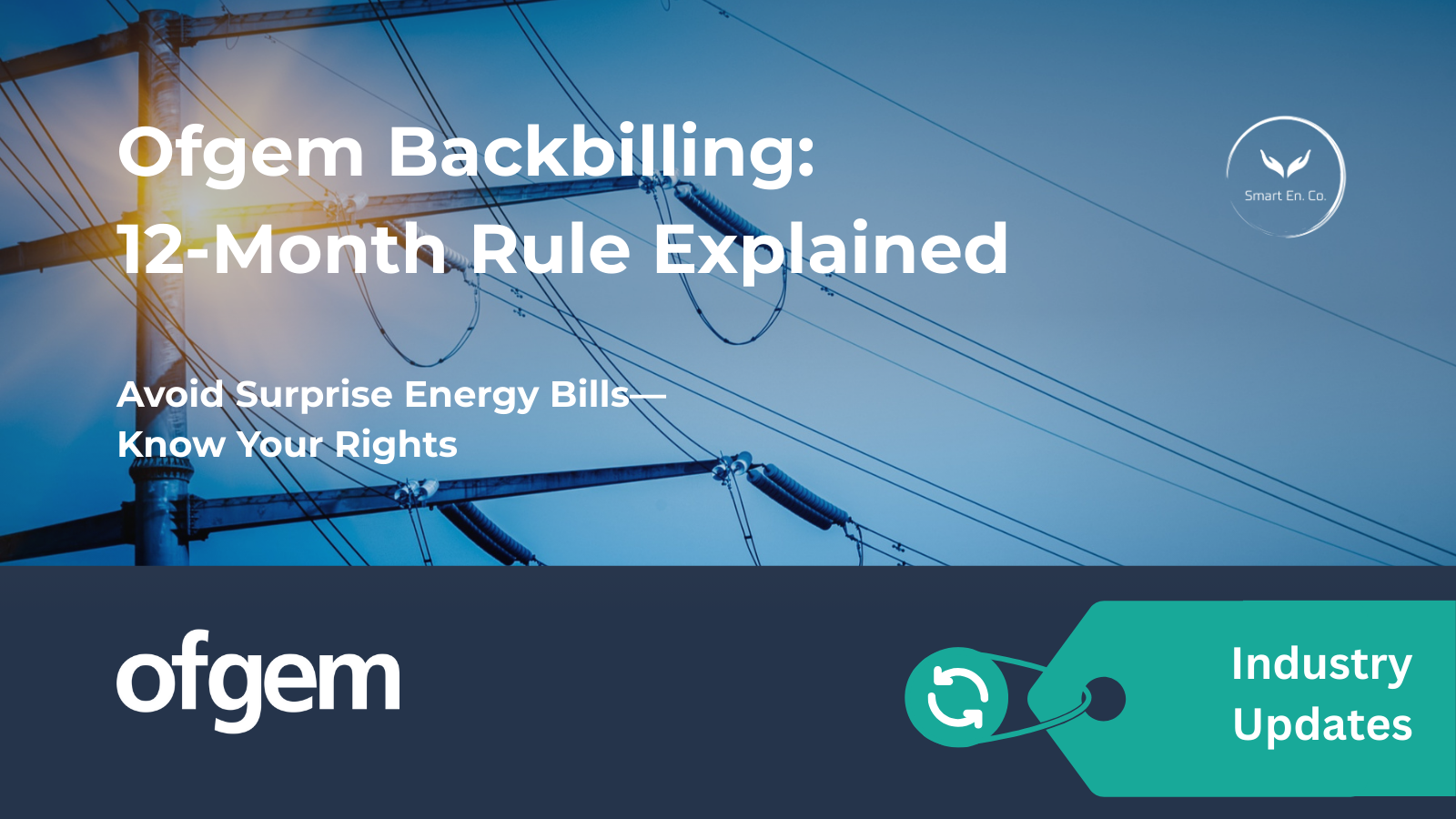Ofgem Backbilling: Myths vs. Reality

Ever heard someone say, “If I don’t pay my energy bills, they can’t bill me for more than 12 months”?
That’s one of the most common misconceptions about
Ofgem’s backbilling rules. These regulations aim to
protect consumers from unexpected, large bills when the delay is purely the
supplier’s fault—not to wipe out unpaid debts.
In this blog post, we’ll demystify Ofgem backbilling rules, clarify who they apply to, and explain the difference between genuine backbilling and simple non-payment.
What Is Backbilling?
Backbilling refers to when an energy supplier issues a bill for energy used in the past that wasn’t previously charged for (or was billed incorrectly). Reasons for backbilling can include:
- Supplier error (e.g., never sending a bill, ignoring meter readings, technical glitches)
- Incorrect meter readings (billing based on the wrong numbers)
- Meter faults (leading to under-recorded usage)
The key point: Ofgem, the energy regulator in Great Britain, limits suppliers from charging customers for energy used more than 12 months ago if the delay was entirely the supplier’s fault. This applies to domestic consumers and microbusinesses.
Are You a Microbusiness?
Many small businesses assume they don’t qualify for these protections, but you might be surprised. According to Ofgem, you’re a microbusiness if you meet any of the following criteria:
- You use less than 100,000 kWh of electricity per year
- You use less than 293,000 kWh of gas per year
- You have fewer than 10 employees and an annual turnover/balance sheet total under €2 million
If you do qualify, you can generally challenge backcharges for usage older than 12 months if it was the supplier’s mistake.
Why ‘Not Paying’ Is Different From ‘Not Being Billed’
A common misunderstanding is thinking that an unpaid bill older than 12 months is automatically void. That’s not how it works. If you received a bill—whether it was accurate, estimated, or final—and you just didn’t pay, that isn’t backbilling, it’s debt.
Backbilling = Being charged (or corrected) late for energy you weren’t properly billed for in the first place.
Debt = You were billed, but chose not (or were unable) to pay
Common Scenarios: FAQ
Below are some typical situations customers face. Click on each scenario to learn how Ofgem’s backbilling rules may—or may not—apply.
“I never received a bill for over 12 months.”
If you’re a microbusiness and the lack of billing is entirely the supplier’s fault (e.g., they never set up your account properly), Ofgem’s rules typically prevent them from charging you for any usage older than 12 months.
- Why? Ofgem says suppliers shouldn’t spring surprise bills on customers if the supplier is to blame.
- Tip: Confirm you meet the microbusiness criteria (usage or staff/turnover limits). If you do, challenge any bill for energy older than 12 months that arises purely from the supplier’s error.
If you’re not a microbusiness:
- Suppliers can usually pursue the full amount, even if it spans more than 12 months. However, they should still communicate clearly and consider fair payment arrangements.
“I received bills but just didn’t pay them—so they can’t charge me for more than 12 months, right?”
No. If you were actually billed (whether estimates or actual reads) for the energy, that’s considered a debt, not backbilling. The 12-month rule does not wipe out unpaid charges.
- Key Point: The rule protects against late or missing bills, not unpaid bills. If you’ve been receiving statements—even if you disagreed with them or didn’t pay—those charges remain valid beyond 12 months.
“They billed me on wrong meter reads; I kept sending the correct reads, but they only fixed it after 18 months.”
This often does fall under the backbilling rules if you’re a microbusiness or domestic customer. Because the supplier had the correct information but failed to apply it, that’s typically considered supplier error.
- Outcome: They may only charge you for the last 12 months of corrected usage once they finally fix the account, not the entire 18 months.
- If You’re Not a Microbusiness: You may not have the same 12-month protection, but you can still raise a dispute, because suppliers must act fairly and avoid undue delays.
“I had estimated bills for ages—then got a huge catch-up bill. Do I still have to pay for all of it?”
It depends on why the bills were estimated.
- If you’re a microbusiness and the supplier didn’t make efforts to get actual readings or update your account, you may be covered by the 12-month rule.
- If you repeatedly blocked meter access or refused to provide readings, the supplier can argue it wasn’t fully their fault. In that case, they can typically recover the full amount.
If you’re not a microbusiness, the supplier might pursue the entire period, but they should handle the catch-up in a fair and manageable way for you.
“My business isn’t a microbusiness—does that mean I have zero protection?”
Not necessarily. Although the official 12-month backbilling cap applies strictly to microbusinesses (and domestic customers), all suppliers must follow Ofgem’s Standards of Conduct and be fair and transparent.
- You can still negotiate payment terms or dispute a backbill if the supplier took unreasonable steps or delayed billing for no valid reason.
- But the specific 12-month limit won’t automatically apply if you’re not classed as a microbusiness.
Key Takeaways
- Know Your Status: Verify whether you’re a microbusiness. You might be protected by the 12-month backbilling rule.
- Backbilling vs. Debt: Not paying an issued bill is debt, not backbilling. The 12-month rule doesn’t wipe out unpaid bills.
- Supplier Fault: If the supplier had the correct info or never sent bills in the first place, that’s on them.
- Act Quickly: If you see incorrect bills or suspiciously low estimates, contact your supplier right away. Document your meter readings and all communications.
Final Thoughts
Ofgem’s backbilling rules are designed to stop surprise, sky-high bills caused by supplier errors. They protect many domestic and microbusiness customers, but not all SMEs automatically qualify. Even if you’re not covered by the 12-month rule, you still have rights—like disputing unreasonable billing practices or arranging affordable payment plans.
If you’re unsure about your microbusiness status or think you’ve been incorrectly billed, take action now:
- Gather evidence (meter readings, emails, call logs).
- Contact the supplier to dispute or discuss payment terms.
- If unresolved, consider escalating to the Energy Ombudsman or seeking independent advice.
Need more advice? Feel free to reach out or drop a comment below—understanding backbilling can save you (or your clients) from confusion and unexpected costs.
Disclaimer: The information provided in this blog is for guidance only and does not constitute legal advice. For specific concerns about your energy bill, consult Ofgem’s official website or seek professional counsel.
Explore More Insights
Dive into more energy updates, market reports, and supplier insights tailored for your business


